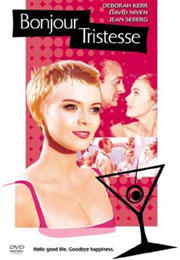 I've never seen a story quite like Otto Preminger's Bonjour Tristesse, from the novel by Francoise Sagan, in which the ultimate playboy father and his daughter are such affectionate pals that their relationship almost substitutes for any other lasting love relationships.
I've never seen a story quite like Otto Preminger's Bonjour Tristesse, from the novel by Francoise Sagan, in which the ultimate playboy father and his daughter are such affectionate pals that their relationship almost substitutes for any other lasting love relationships. I've also rarely seen such a convincing depiction of hell on earth, though Cecile uses the term 'Limbo,' which is even more suggestive. In fact, I've rarely seen so strong a film give up its game so openly. Cecile narrates her situation openly and honestly from the beginning, and in the end it's hard to know whether she has learned enough to ever escape. The film gives me the strange feeling of "slumming" with the rich.
Deborah Kerr and David Niven are excellent in their roles. Kerr is convincingly beautiful and sophisticated enough to summon a mature fascination from Raymond, yet stern and confrontational enough to alienate Cecile, who actually desperately needs her good influence. Kerr is such an intriguing actress, clearly a great film actress who amassed a particularly impressive body of work, yet she is so old-fashioned. Her work is often defined by sexual passion, but there is something profoundly prim about her. Like Julie Andrews, she seems the quintessential governess, or is at least always battling such a perception. (Of course, Kerr played a nun more than once, let alone a governess, famously, in The King and I.) Here she believably plays a sophisticated designer from the highest world of fashion who finds herself competing with chic young women who sport her designs. From almost the moment she enters, there is something deeply stormy in her temperament that prepares us for the tragic confrontation to come.
Niven's character is admirably well-rounded, managing to be both suave and charming, yet at the same time deplorable. His portrayal clinches the theme of the tragedy of misguided parenting. Mylene Demongeot is enormously charming as Raymond's summer fling, vivaciously cute with her adorable accent yet superficially selfish to a fault. (I was also happy to spot Martita Hunt in a small part. She had such wonderful presence in Preminger's Bunny Lake is Missing, and, looking her up, I find she became famous for playing Miss Havisham in David Lean's 1946 Great Expectations.)
Star Jean Seberg, in her second role, working again with her discoverer Preminger, is a unique presence. She narrates the film in a way that usually doesn't work in film. She also delivers her lines in a distractingly well-enunciated style. These quirks may be off-putting for some in the audience, but they are part of the film's style, and I adjusted to them quickly. Besides, delivery is only one facet of acting. Seberg's movement is gorgeously fluid, and her look (petite, feminine, with a tomboy haircut) is stylishly modern. When she gazes directly into the camera (though she's actually looking at the chanteuse Juliette Greco singing the haunting title song by Georges "Les Six" Auric in a nightclub scene), she breaks my heart. Of course, her sad personal story lends power to the sadness here.
The cinematography by Georges Perinal (who shot such major films as Le Million, The Life and Death of Colonel Blimp and A nous la liberte) is excellent, using a mix of color and black&white to express a before and after, two states of the soul, one of ignorance, even a kind of innocence, and the other of deepest remorse. The French Riviera never looked so beautiful (sparkling, blue water) and yet so haunted. The camera keeps more of a distance from these characters than usual, which, combined with their sometimes ugly behavior, helps us to maintain perspective without getting too swept up in the story. It strikes a good balance. One particularly memorable sequence mostly in long shot captures the dance of our main characters in a crowded outdoor cafe late one dark summer night. It reminded me a bit of Tati's much more elaborate final section of Playtime. If they end in limbo, this represents the moment when they are closest to heaven.
Rating: 3 1/2 out of 4 stars.
Song: "Walk Right Back" by The Everly Brothers - heard this before a concert recently for the first time and loved it. Now I'm on an EB kick.
Labels: Movie Reviews, Preminger


0 Comments:
Post a Comment
<< Home